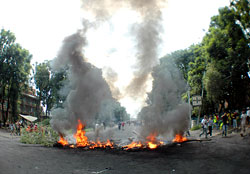|
|
Time and again, we see the influence of some kind of 'people power,' whether real or manufactured. Over last weekend, for example, we saw the government announce an economically sensible price hike and, after a day-and-a-half of street protests and hooliganism, retract it. Tyre power, in all its riotous glory.
There is a lesson here, and it isn't about whether the tyre-burners are right or wrong (they're wrong, for health reasons among others), whether the government is right or wrong in treating petrol and kerosene at par for price rise (debatable), not even whether the Maoists have capitalised on and possibly fuelled popular discontent (probably).
The issue this: are we going to have future governments installed only through people power or are we going to elect them at the ballot box? And when we finally do have a representative government will it be overthrown by mobs on the streets? How much should rent-a-crowds and rampaging student affiliates of an underground militant party have a say in regime change or government policy? Is setting fire to tyres the way we are going to make decisions henceforth?
Fuel prices in Nepal can't be lower than in India, that is our geopolitical reality. Until we seal that border or earn enough hydro-dollars from exporting power we won't be able to subsidise fossil fuels. So why not make a policy that will immediately favour transport alternatives to reduce our dependence on diesel, kerosene, and petrol? Like, today.
And it's not just about fuel prices. It's the tea garden strike, the temporary teachers, students who get hard exam questions, taxi drivers who block the airport for the whole day. These are symptoms of a society in political transition. Get through it we will. It won't be easy but as we muddle our way through we have to keep in mind that if we truly want a functioning, inclusive democracy that has half a chance of being successful we must be part of it. All of us.
When we make our roadmap one section of it should be on civic education: rights, responsibilities, reasonable expectations and unreasonable means of expressing discontent. What does it mean to be a citizen? If we do it right, we could have a people that understands democracy. And that's true people power.



